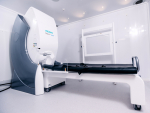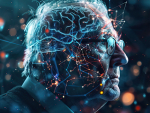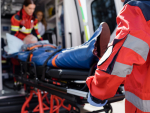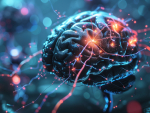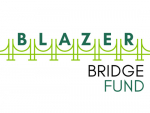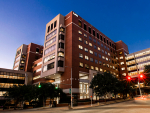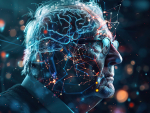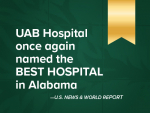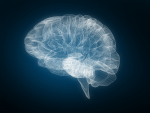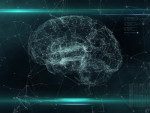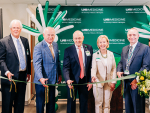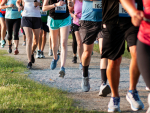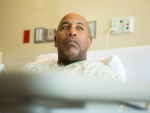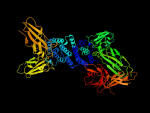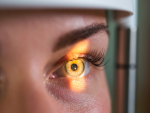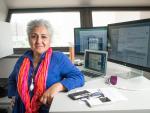Displaying items by tag: department of neurology
Rachel Smith, Ph.D., is collaborating with researchers across UAB on the two-year project, which will focus on the intracranial neural networks responsible for major depressive symptoms in epilepsy patients.
Tagged under
UAB was among the first medical centers in the country to obtain a MEG, having done so originally in 2001; however, evolving technology has created a need for replacing the old technology with a new one.
Tagged under
Human proteins identified that explain inter-individual differences in functional brain connectivity
This is a step toward an understanding of the brain that ultimately describes the mechanistic basis of human cognition and behavior.
Tagged under
Leveraging the existing Alabama Trauma and Statewide Stroke systems, UAB and ADPH have created a model for a more integrated and effective system of emergency stroke care.
Tagged under
Results suggest that, rather than stimulating both sides of the brain using DBS, unilateral right DBS may avoid DBS-related declines in verbal fluency and response inhibition in patients with movement disorders like Parkinson’s disease.
Tagged under
Blazer Bridge Fund provides financial support to innovative ideas and inventions by the UAB community, encouraging advanced discovery.
Tagged under
- release
- harbert institute for innovation and entrepreneurship
- school of medicine
- school of engineering
- college of arts and sciences
- department of neurosurgery
- department of neurology
- department of mechanical engineering
- department of pediatrics
- department of electrical and computer engineering
- department of dermatology
- department of endocrinology, diabetes, and metabolism
- department of ophthalmology and visual sciences
- department of physics
- artplay
- uab arts
UAB Medicine has received the American Heart Association’s Get With The Guidelines® - Stroke Gold Plus with the added distinctions of Target: Stroke℠ Honor Roll Elite Plus and Target: Type 2 Diabetes™ Honor Roll.
This finding suggests that therapy to remodel synapses could help memory in old age and dementia patients.
Tagged under
For 11 consecutive years, U.S. News has named UAB Hospital the best hospital in Alabama, with several specialties and procedures ranked among the best.
Tagged under
- release
- uab medicine
- uab hospital
- school of medicine
- department of obstetrics and gynecology
- department of neurology
- department of neurosurgery
- department of otolaryngology
- division of gerontology geriatrics and palliative care
- division of pulmonary allergy and critical care medicine
- division of endocrinology diabetes and metabolism
- department of urology
- department of orthopaedics
- division of gastroenterology and hepatology
- division of gastrointestinal surgery
- division of cardiovascular disease
- division of cardiothoracic surgery
- department of orthopaedic surgery
By prohibiting the Activin A protein from functioning, researchers were able to halt the development of dyskinesia symptoms and effectively erase the brain’s “bad memory” response to L-DOPA treatments.
Tagged under
The new, five-year grant will support research in the UAB Alzheimer’s Disease Research Center to address dementia disparities in the Deep South.
Tagged under
Ninety-two percent of evaluable patients treated with INB-200 exceeded a median progression-free survival of seven months. Glioblastoma multiforme is the most aggressive type of cancer originating in the brain.
Tagged under
The new Brain Aging and Memory Hub will house the UAB Divisions of Neuropsychology and Cognitive and Behavioral Neurology, as well as the Alzheimer’s Disease Center and the Evelyn F. McKnight Brain Institute.
Tagged under
Muhammad Ali Abdullah is graduating with two degrees, profound research and clinical experience, and memories to cherish for a lifetime; he will be returning to UAB this July as a medical student.
Tagged under
The Goldwater Program received 1,353 nominations from 446 institutions this year, and the winners will receive a scholarship covering tuition, housing, fees and books.
Tagged under
- release
- college of arts and sciences
- neuroscience
- school of medicine
- department of neurology
- department of cell developmental and integrative biology
- department of philosophy
- graduate school
- honors college
- office of the provost for student and faculty success
- national and international fellowships and scholarships
- students
The annual race will be held Saturday, May 18, at Railroad Park. A virtual option will be offered this year.
Tagged under
Results showed that African American veterans with PTSD had a higher risk of rehospitalization than those without PTSD. However, white veterans with PTSD did not have a significantly higher risk of rehospitalization post-stroke.
Tagged under
Multiple system atrophy is a rare and fatal neurodegenerative disease, with no known disease modifying therapy.
Tagged under
These findings could lead to non-invasive, low-cost tests and the early diagnosis of the disease, which progresses for decades before symptoms of dementia emerge.
Tagged under
New findings from UAB researchers indicates that preventable environmental factors like repeated blows to the head in contact sports and pesticides and herbicides account for a substantial number of Parkinson’s disease cases.
Tagged under

